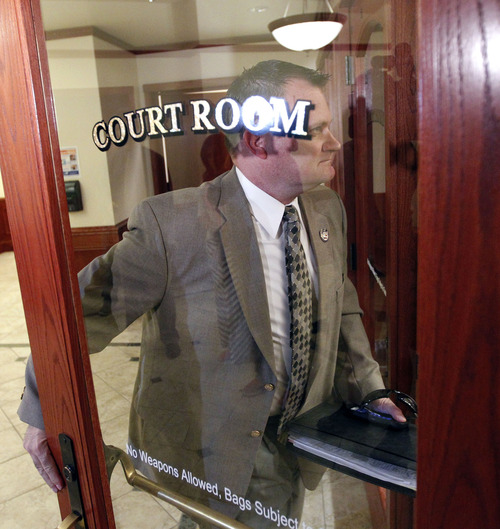This is an archived article that was published on sltrib.com in 2013, and information in the article may be outdated. It is provided only for personal research purposes and may not be reprinted.
Closing arguments in a civil stalking case against Clark Aposhian may explain why attorneys think Utah's premier gun lobbyist should have access to his arsenal of an estimated 300 weapons.
But the public may never know what those reasons are or, conversely, what the arguments against his access to firearms may be.
A January 2012 decision by the Utah Supreme Court and the Utah Judicial Council changed state court rules in family cases and switched court filings in thousands of cases from public to private. Many of the documents in the civil stalking injunction filed against Aposhian by his ex-wife's husband are sealed as private and may not be available for public view.
"It is a tricky balance there but in the end I think the Judicial Council felt that we need to protect that aspect of privacy," said Jared Hales, chairman of the Utah Bar's family-law section, which asked for the rule change in 2011.
The adopted court rules said outside parties can petition judges to make records public, and the attorneys involved must argue why the documents should remain private.
The Salt Lake Tribune has requested District Court Judge Terry Christiansen make written closing arguments public, and a hearing has been scheduled for Aug. 13 in West Jordan to determine whether the public can access the documents.
The hearing marks the first time the 2012 rule will be tested in court for a high-profile case.
"I do think it's important for the court to have the discretion to make documents available to the public in certain cases," Hales said. "Particularly if there is a public interest at stake."
Aposhian — the main face of the gun lobby on Utah's Capitol Hill and a concealed-firearms instructor who has conducted classes for thousands — was ordered to give up his trove of guns after a Memorial Day incident in which he drove a 2.5-ton "Zombie Response Vehicle" onto his ex-wife's driveway. He also allegedly made threats over the phone to the ex-wife's husband, who called police.
He was arrested and charged with several misdemeanors, including criminal trespassing and domestic violence in the presence of a child. His ex-wife also filed a protective order against him.
Aposhian and a witness who heard Aposhian's end of the phone denied in court testimony that he made the alleged threats.
Mitch Olsen, the attorney representing the ex-wife's husband, filed his closing arguments July 30. He was allowed 10 pages of arguments, five to explain why he thinks the civil stalking injunction should be permanent and five arguing whether Aposhian should be allowed access to his weapons.
Aposhian's attorneys, Mitch Vilos and Morgan Philpot, can then rebut the arguments. Aposhian, his attorneys and Olsen didn't return requests for comment on Wednesday.
Christiansen's ruling on the injunction is expected later this month.
Aposhian is scheduled to appear Aug. 21 in Holladay Justice Court on the domestic violence charge and Sept. 3 in Salt Lake City for the protective order.



